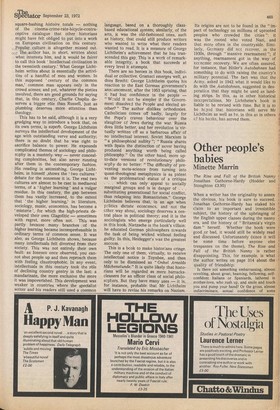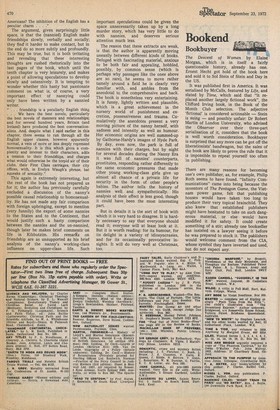Other people's babies
Minette Marrin
The Rise and Fall of the British Nanny Jonathan Gathorne-Hardy (Hodder and Stoughton £3.95) When a writer has the originality to annex the obvious, his book is sure to succeed. Jonathan Gathorne-Hardy has staked his claim to an important and irresistible subject, the history of the upbringing of the English upper classes during the nanny era, and the history of "Britannia's virgin dam" herself. Whether the book were good or bad, it would still be widely read and discussed. Unfortunately (since it will be some time before anyone else trespasses on the theme), The Rise and Fall of the British Nanny is rather disappointing. This, for example, is what the author writes on page 314 about the quality of friendship: Is there not something embarrassing, almost revolting, about great, beaming, bellowing, selfconfident Italians or Spaniards, lathered in mother-love, who rush up, and smile and touch you and pump your hand? Or the gross, almost indiscriminate, sexual confidence of some
Americans? The inhibition of the English has a peculiar charm . . . ."
The argumen,t, given surprisingly little space, is that the (nannied) English make friendships slowly, verbally and socially; they find it harder to make contact, but in the end do so more subtly and profoundly. This may be true, but it is both irritating and revealing that these interesting thoughts are rushed rhetorically into the last pages of the book, which until the tenth chapter is very leisurely, and makes a point of allowing speculations to develop slowly and ostensively. It is tempting to wonder whether this hasty but passionate comment on what is, of course, a very important effect of nannying could only have been written by a nannied writer.
" . . . friendship is a peculiarly English thing . . . We have the best novels, particularly the best novels of manners and relationships; and for several hundred years, Britain (and Ireland) have produced the best conversationalists. And, despite what I said earlier in this chapter, there seems to run through all the English upper classes, however apparently normal, a vein of more or less deeply repressed homosexuality. It is this which gives a complexity and interest to their characters, adds a tension to their friendships, and charges what would otherwise be the torpid air of their clubs, their First Class carriages, their city offices, with, in Evelyn Waugh's phrase, bat squeaks of sexuality."
This again is extremely interesting, but the rest of the book has not prepared us for it; the author has previously carefully excluded a discussion of the nanny's possible causal relationship to 'homosexuality. He has not made any fair comparison with foreign upbringing, except to mention (very funnily) the export of some nannies to the States and to the Continent, that would justify such a hasty comparison between the nannies and the un-nannied, though later he makes brief comments on life in Kibbutzim. His remarks on friendship are as unsupported as his brief analysis of the nanny's working-class influence on upper-class life. Such important speculations could be given the space unnecessarily taken up by a long murder story, which has very little to do with nannies, and deserves serious attention much less.
The reason that these extracts are weak, is that the author is apparently moving uneasily between different kinds of books. Deluged with fascinating material, anxious to be both fair and appealing, hobbled, possibly, by common sense (which is perhaps why passages like the ones above are so rare), he seems to move rather tamely around a field he is clearly very familiar with, and ambles from the aneodotal to the comprehensive and back. The book is nonetheless very entertaining. It is funny, lightly written and plausible, which is a great achievement in the nursery world of punishment and excretion, possessiveness and trauma. Cumulatively the anecdotes present a very moving picture of the nanny herself, with sadness and intensity as well as humour. Her economic origins are well summed-up by Gathorne-Hardy's images of Hyde Park. By day, even now, the park is full of nannies with their charges, but by night for several decades during the Nanny Era it was full of nannies' counterparts, prostitutes, responding rather differently to the same economic pressures that made other young working-class girls give up almost all chance of a private life for security in the form of other people's babies. The author tells the history of nannies well and sympathetically. His analysis of their effect is less good, though it could have been the most interesting part.
But in details it is the sort of book with which it is very hard to disagree. It is hardly necessary to say that everyone should read it; everyone will at least look at it. But it is worth reading: for its humour, for its delight in a variety of idiosyncrasies, and for its occasionally provocative insights. It will do very well at Christmas, too.



































 Previous page
Previous page